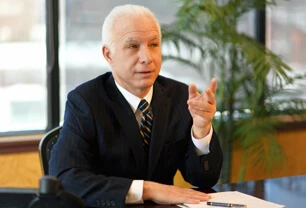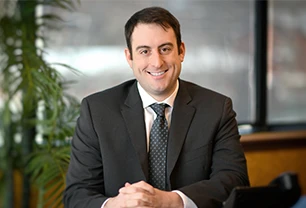New York and Long Island Workers Compensation Lawyers Assisting Injured Workers in Litigation
The workers’ compensation lawyers of Turley Redmond & Rosasco, L.L.P. appear at hearings before judges at the New York Workers’ Compensation Board all day, every day of the week. This daily experience “in the trenches” of fighting workers’ compensation insurance companies on behalf of our clients sharpens the legal skills we need to get you all the cash and medical benefits you deserve.
You have the right to a hearing before a New York workers’ compensation law judge in the following situations:
- When your benefits are decreased or terminated.
- To challenge a claim denial.
- To fight a low disability rating or another adverse outcome of filing a claim.
Additionally, you have the right to appeal an unfavorable decision made by a Workers’ Compensation Board judge.
The firm of Turley Redmond & Rosasco, L.L.P., has a solid record of success in New York workers’ comp hearings and appeals. Our attorneys have decades of experience successfully representing injured workers with their injury claims. It is for this reason that a majority of our current clients are referred by former satisfied clients.
|
Workers’ Compensation Hearings
Many workers’ compensation claims are denied or minimized by employers and their insurance carriers. This is often an effort solely to save them money and cause you so much misery that you are economically forced to return to work before you have fully recovered. They will often send you to one of their “hand-picked” doctors who will do a five-minute medical exam on you, which results in a severe reduction or termination of your benefits. The effect is that you can’t work, you can’t pay your bills, you can’t get the proper medical care you need to get better, and you feel compelled to return to work just to survive.
Turley Redmond & Rosasco fight these types of insurance company tactics every day at hearings before judges at the New York State Workers’ Compensation Board (WCB). Our worker’s compensation lawyers have handled thousands of WCB hearings over the past 25 years, including claim denials and emergency hearings to restore benefits. We know how to cross-examine witnesses, physicians, and other defense experts to get them to tell the truth. We know what medical documentation is required and how to present it to a judge in order to turn your case around to win.
Workers’ Compensation Appeals for Denied Claims or Other Discouraging Outcomes
The New York Workers’ Compensation Board regularly denies initial claims for a variety of reasons. You can appeal this decision with the help of an experienced team of workers’ compensation lawyers.
Turley Redmond & Rosasco has handled workers’ compensation appeals for nearly 30 years throughout Manhattan, Nassau, and Suffolk County.
We offer a free case evaluation where we provide honest advice regarding your chances of success, as well as the costs and time commitment involved in the appeal process. If we believe you have a strong claim, we prepare a compelling argument as to why the decision for denial was incorrect.
We encourage you to seek immediate counsel if your claim was denied. You have only 30 days to file your appeal, and you waive important rights if you miss the deadline.
Why Was Your Workers’ Compensation Claim Denied?
A denial may feel frustrating, but it is very common. Below are a few typical reasons the workers’ compensation insurance company gives for denying a claim:
- The accident did not occur at work or in a work-related capacity.
- You were not injured, or your injury is not as serious as you claim.
- You do not require medical treatment.
- You do not have a disability.
- Your injury was pre-existing before the accident.
- The type of injury you sustained is not covered by workers’ compensation.
- You are not an employee covered under the workers’ compensation plan.
- You failed to notify your employer or file your claim in a timely manner.
- You were impaired by alcohol or drugs when the accident occurred.
- You filed the wrong paperwork or supporting documents.
How to Appeal the Denial of Your Claim
The deadline for filing your appeal is 30 days from receiving your denial letter. You have the opportunity to file evidence to counter the insurance company’s assertions. The workers’ compensation judge will hold a hearing to consider your arguments and review the evidence.
If the workers’ compensation judge rules against you, you may submit a request for review to the workers’ compensation board within 30 days from the date of the unfavorable ruling. Your employer and its insurance carrier also have the right to ask for a review. A three-member panel decides whether to accept your request based on your arguments and the evidence you submit. If the panel accepts your request, the board members review your case and either affirm, modify, or rescind the judge’s decision.
If you do not agree with the board panel’s decision, you can appeal to the NY appellate division within 30 days of the board’s decision. An unfavorable decision at this level may be appealed in a higher court.
When Should I Search for Workers Compensation Lawyers?
It is important from the start to hire a workers comp lawyer with the ability to take your case as far as necessary.
- If the law judge in your Workers’ Compensation Board hearing rules against you, we will appeal to a Board Panel of three WCB judges for reconsideration of that decision.
- If the Board Panel lets the decision stand, we can petition the full Workers’ Compensation Board and/or the Appellate Division of the New York State Supreme Court to reverse your decision.
Our attorneys know how to argue the points of law in claims and hearings to establish grounds for later appeals. Our workers’ compensation lawyers are skilled at preparing written briefs and presenting oral arguments in these technical cases. We are committed to giving injured workers the best chance of success in a complicated adversarial system.
How Does the Workers Compensation Appeals Process Begin in New York?
In the workers’ compensation system, you may find yourself in a situation wherein your employer’s workers’ compensation insurance carrier denies your claim and files a notice of controversy with the New York Workers’ Compensation Board. At this point, your claim becomes a “controverted claim.” In the notice of controversy, the insurance carrier must state the reason why it is not paying your claim. Insurance carriers frequently deny claims for a variety of reasons. Once a claim is controverted, it is referred to a Workers’ Compensation Law Judge (a type of administrative law judge), who will review the evidence and hear both sides of the issue in dispute.
Some of the evidence the judge will consider includes testimony from the parties, medical reports, and wage statements. The judge will then make a determination as to whether you are entitled to benefits, the amount of benefits you are entitled to, and how long you should receive them. For more information about the workers’ compensation appeals process, please contact the Long Island worker’s compensation lawyers at Turley, Redmond, and Rosasco.
What Happens During a Hearing?
A workers’ compensation hearing, unlike judicial proceedings that you may see on television or in the news, usually takes place in an administrative hearing room. However, a formal proceeding and a digital recording is made of everything that takes place. The parties often appear virtually, that is, away from the hearing location through electronic means. During the hearing, you and your attorney will present arguments to the judge as to why you are entitled to a workers’ compensation award and justifications as to why you should receive the largest award possible. Your employer’s insurance company and its lawyer will argue the opposite — that you are not entitled to a workers’ compensation award or that your award should be reduced. Other witnesses may also be present; any individuals who can testify about the events that caused your injury. If medical witnesses are necessary, their testimony is usually taken by deposition on another date and time. The transcript of the deposition is later presented to the Judge as evidence. The Judge will impartially review the evidence and arguments from both sides and render a decision in favor of one side or the other.
Who Are the Parties to an Appeal?
There are several important parties to a workers’ compensation hearing. The most important are:
- You and your worker’s comp attorney, who will argue your case to the judge
- Your employer’s insurance company’s attorney, who will argue your employer’s case to the judge
- The judge, who is an impartial arbiter
Other individuals present may include your witnesses and your employer’s witnesses. The proceedings are recorded digitally and preserved for the record.
What Evidence Should You Bring to a Hearing?
Your word is not enough to convince a Judge to render a decision in your favor. Rather, you must submit concrete evidence that proves the extent of your damages and your eligibility to receive workers’ compensation benefits. At the hearing level, this can include:
- All evidence you originally submitted with your workers’ compensation claim (a written statement about what happened, employment history, medical records, pictures of your injury, statements from coworkers, etc.)
- Testimony from your doctors
- Testimony from occupational therapists
- Testimony from your coworkers, managers, or anyone else who witnessed the events that gave rise to your injury
Your employer and its insurance company can use the same evidence to argue that you are not entitled to workers’ compensation benefits. The parties may also provide the Judge with a statement of facts that each side agrees upon, such as the date the injury occurred, the amount of wages you have lost due to being out of work, the existence of a pre-existing condition, etc. This statement helps the Judge understand what is and what is not in controversy and can expedite the process. The Long Island workers’ compensation lawyers at Turley Redmond & Rosasco can help you gather the evidence that is most favorable to you and advocate on your behalf.
Can Your Lawyer Appeal a Workers’ Compensation Law Judge’s Decision?
Yes. If you are unsatisfied with the outcome of your hearing, your worker’s compensation lawyer may appeal the judge’s decision to the Workers’ Compensation Board and then to an appellate court.
Level I Appeal: Workers’ Compensation Board Review
If you are not satisfied with the Workers’ Compensation Law Judge’s decision, you may appeal the decision by submitting an Application for Board Review within 30 days of the date it is filed. Keep in mind, however, that your employer and insurance carrier may also appeal the Judge’s decision if the original decision was in your favor. At this level of appeal, the Workers’ Compensation Law Judge’s decision will be reviewed by three members of the New York Workers’ Compensation Board. The panel may affirm, modify, or rescind the lower Judge’s ruling. If the decision of the panel at Level I is not unanimous you may petition for mandatory review by the full Workers’ Compensation Board. If the three-judge panel is unanimous, you may petition for discretionary review by the full board.
Level II Appeal: Appellate Division Review
If you are not satisfied with the board’s decision, you may appeal again to the Appellate Division, Third Department, Supreme Court of New York, within 30 days of the date it is issued. The Appellate Division may affirm, modify, or rescind the Workers’ Compensation Board decision. When you appeal to the Appellate Division, your appeal leaves the administrative confines of the Workers’ Compensation Board and enters the civil court system.
Level III Appeal: Court of Appeals Review
In rare instances, appeals may be made from the Appellate Decision to the New York Court of Appeals — the state’s highest court. Very few workers’ compensation appeals make it to this stage of the appeals process unless they involve a unique or unsettled question of workers’ compensation law.
Employer Responsibilities in Workers’ Compensation Cases
Workers and employers both have rights and responsibilities under New York’s workers’ compensation laws. While it may seem like the burden of the workers’ compensation application process falls entirely on workers, employers have numerous behind-the-scenes responsibilities before, during, and after an injured worker files a workers’ compensation claim. The most notable of those responsibilities include;
- Carrying workers’ compensation insurance: Virtually all for-profit employers in the state of New York are required to carry workers’ compensation insurance for their employees. This includes full-time, part-time, seasonal, temporary, and casual employees. Failure to carry workers’ compensation insurance can expose an employer to both civil and criminal penalties.
- Posting a Notice of Compliance – Workers’ Compensation Law in their place of business
- Keeping an accurate, four-year record of the number of employees, their classifications, their wages, and their workplace accidents
- Reporting workplace injuries and occupational illnesses to the Workers’ Compensation Board and their insurance carriers within 10 days after an accident
- Keeping and maintaining records of employee injuries and illnesses
- Keeping worker reports of workplace injuries on file for at least 18 years and making them available for Board review at any time
- Reporting injured workers’ wages to the Board
- Reporting changes in injured workers’ pay or work status to the Board
The law also places some restrictions on the behavior of employers before, during, and after the claims process. Employers may NOT:
- Ask workers whether they have any outstanding workers’ compensation claims before hiring them
- Discriminate against workers because they have filed or are planning to file a workers’ compensation claim
- Mandate that workers receive care from a particular health care provider (unless the employer participates in a Preferred Provider Organization or Alternate Dispute Resolution program)
- Discuss a worker’s injury or treatment with their health care provider without their knowledge
- Prevent workers from filing workers’ compensation claims
- Requiring workers to pay for workers’ compensation insurance coverage
If your employer has failed to meet one or more of its responsibilities or engaged in prohibited activity, our workers’ compensation lawyers can help you hold them accountable.
Negotiating Settlements in Workers’ Compensation Cases
Most New York workers’ compensation cases are resolved through settlements. There are several reasons why that is the case. Settling with your employer’s workers’ compensation insurance provider is often a faster way to resolve your claim than fighting it all the way through the hearing and appeals stages. And if there is a significant risk that your claim will be denied at those stages, compromising with your employer’s workers’ compensation insurance provider may be your best chance for obtaining benefits.
There are two main types of workers’ compensation settlements in New York: stipulations and Section 32 agreements. Both types of settlements must be reviewed and approved by a Workers’ Compensation Law Judge (WCLJ) or the Board before going into effect.
Stipulations
Stipulations are a type of settlement agreement that allows you and your employer’s workers’ compensation insurance provider to agree to stipulate certain facts or proposed findings. For example, you might agree on the degree of your disability or the amount of benefits to which you are entitled. There are three ways stipulations may be submitted and approved by the Board:
- At a hearing, by making an oral statement on the record that is then approved by the WCLJ
- At a hearing, by submitting a written stipulation form that is signed by the parties and then approved by the WCLJ
- Outside a hearing, by sending a written stipulation to the Board that is signed by the parties and then reviewed and approved by the WCLJ
Our workers’ compensation lawyers can help you determine whether you should stipulate to any facts and whether doing so would be in your best interest.
Section 32 Agreements
Section 32 agreements (also known as “lump sum” settlements) are agreements between you and your employer’s workers’ compensation insurance provider to settle your claim for wage benefits, medical benefits, or both. Under a Section 32 agreement, you receive a one-time, lump-sum, tax-free payment in exchange for waiving your right to ongoing and future benefits. Once you agree to a Section 32 settlement, your claim is closed and cannot be reopened. Section 32 agreements can be an attractive option for injured workers who need benefits quickly to pay off mounting bills and who want to bypass protracted litigation. Because Section 32 agreements end your right to claim future benefits, it goes without saying that you should consult a workers’ compensation lawyer before accepting one.
What Happens During a Hearing
Who Requests the Hearing?
Hearings typically arise when your employer’s workers’ compensation insurance provider disputes one or more issues in your claim. For example, the insurer may deny your claim as not involving a work-related injury, or it may argue that it is the result of a pre-existing condition. If that happens, either party may request a hearing before a WCLJ to address the issues in dispute.
What Can I Expect During the Hearing?
Workers’ compensation hearings are similar to (although less formal than) traditional trials. The hearing generally will focus on the issue that is in dispute. Each side may present evidence and call witnesses. Such evidence can include medical records, unpaid medical bills, evidence of lost wages, and depositions of expert witnesses (such as your medical team). The star witnesses of the hearing is typically the injured worker, who presents their side of the story. At the conclusion of the injured worker’s testimony, the insurance company’s lawyer typically will cross-examine them in an attempt to discredit their version of events.
When Will I Receive a Decision?
After reviewing all evidence and hearing all testimony, the WCLJ will issue a “notice of decision” reflecting their findings within a few days of the hearing. If the issues presented are especially complex, the WCLJ’s decision make take longer to issue (usually a week or more). If the WCLJ denies the claim, the injured worker and their workers’ compensation lawyers may appeal the denial to the Appeals Council within 30 days.
Contact Our Workers Compensation Lawyers for Assistance With Your Claim
If you have been denied workers’ compensation or encountered problems with your medical or wage benefits, you can count on us for an honest evaluation of your case and vigorous pursuit of your legal remedies. With over 25 years of successful experience handling workers’ comp claims throughout New York and Long Island, our workers’ compensation lawyers will help you obtain the benefits you deserve.
For a free consultation, call 800-671-4927 or contact us online. We have offices conveniently located in Nassau County and Suffolk County.












